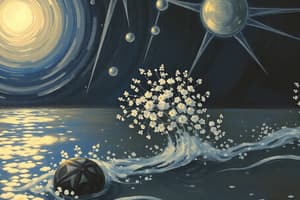Podcast
Questions and Answers
What is the underlying principle of modern scientific understanding?
What is the underlying principle of modern scientific understanding?
- Scientific theory (correct)
- Anecdotal evidence
- Personal opinions
- Religious beliefs
What distinguishes scientific theories from personal opinions?
What distinguishes scientific theories from personal opinions?
- Personal opinions are grounded thoroughly in facts
- Scientific theories are based on facts and tested repeatedly (correct)
- Personal opinions are accepted universally
- Scientific theories are based on anecdotes
Which field of science focuses on human behavior and society?
Which field of science focuses on human behavior and society?
- Botany
- Biology
- Astronomy
- Economics (correct)
What is a hallmark of science regarding the accumulation of knowledge?
What is a hallmark of science regarding the accumulation of knowledge?
Why is collaboration fundamental in scientific endeavors?
Why is collaboration fundamental in scientific endeavors?
How do scientific theories become convincing over time?
How do scientific theories become convincing over time?
What is one of the central characteristics of science mentioned in the text?
What is one of the central characteristics of science mentioned in the text?
Which concept within the scientific method ensures that theories can be tested and proven false?
Which concept within the scientific method ensures that theories can be tested and proven false?
What is the key process that allows scientists to build up knowledge over time using shared standards of evidence and argumentation?
What is the key process that allows scientists to build up knowledge over time using shared standards of evidence and argumentation?
Which element involves other researchers independently verifying the results obtained from any given procedure?
Which element involves other researchers independently verifying the results obtained from any given procedure?
What is the final step in the scientific method that involves sharing findings with the broader scientific community?
What is the final step in the scientific method that involves sharing findings with the broader scientific community?
Why is it important for something to be falsifiable in order to be considered scientific?
Why is it important for something to be falsifiable in order to be considered scientific?
Study Notes
Science: Characteristics and Scientific Theory
Science is a systematic method used by humans to understand how the universe works. It involves observing natural phenomena, formulating explanations based on such observations, and testing these explanations through experiments. There are several key elements that define what is considered part of the realm of science. These elements can be broken down into two main categories: those related to its methods and conventions, and those associated with particular areas of knowledge.
Methods and Conventions
One central characteristic of science is empiricism, which means basing conclusions solely upon evidence gained through observation or experimentation. Another important element is the scientific method itself, consisting of steps like making observations, asking questions, forming hypotheses, designing tests, collecting data, analyzing results, drawing conclusions, publishing findings, and peer reviewing work done by others. This process allows scientists to build up knowledge over time using shared standards of evidence and argumentation.
A critical component within this framework is the concept of falsifiability – if something cannot be proved false, it cannot be scientific because there would be no way to test whether one's theories were correct. Additionally, replicability – meaning that other researchers could independently verify the results obtained from any given procedure – is also crucial. If someone else tries out your experiment and gets different results, you need to go back and check your assumptions and procedures to see where you went wrong. In essence, all claims must be subjected to rigorous scrutiny.
Knowledge Areas
The breadth of possible subjects covered within science ranges widely; however, they generally fall under three broad headings: physical sciences, life sciences, and social sciences. Physical sciences explore nonliving things and processes: astronomy looks at stars and planets while physics investigates forces and matter between atoms. Life sciences deal specifically with living organisms, including biology, botany, and zoology. Social sciences focus more broadly on human behavior and society, incorporating fields like economics, psychology, anthropology, sociology, and political science. Each has distinct branches and specialized practices, yet each shares core principles, tools, concepts, and methods.
Within these diverse disciplines lies another fundamental feature of scientific endeavor: collaboration. Because so much information needs to be gathered and analyzed before conclusions can be drawn, most projects require multiple people working together to accomplish their objectives. Within academia especially, papers written jointly by many authors have become commonplace.
Scientific Theory
Underpinning almost all aspects of modern scientific understanding is the principle of 'scientific theory'. A scientific theory is a well-substantiated explanation of some aspect of the natural world that is acquired through the scientific method, tested repeatedly, and confirmed through repeated experience. Unlike personal opinions, theories are grounded thoroughly in facts, building up layer upon layer until the resultant body of knowledge becomes convincing enough to satisfy even skeptical minds. For example, Einstein's general theory of relativity – now accepted universally - was initially viewed with suspicion when first proposed in 1915. Over subsequent decades, numerous independent confirmatory instances accrued, culminating ultimately in widespread acceptance today.
In summary, science encompasses diverse fields united by specific principles and methods of investigation. Its major hallmarks lie in empirical verification, reproducibility, collaborative effort, and gradual accumulation of credible knowledge via theoretical constructs capable of being put to rigorous practical test. As new truths emerge due to further exploration, refinement, and collective insight, our understanding continually deepens, enhancing both our comprehension of reality and our ability to manipulate it wisely.
Studying That Suits You
Use AI to generate personalized quizzes and flashcards to suit your learning preferences.
Description
Explore the fundamental characteristics of science, including its methods, conventions, and various knowledge areas such as physical sciences, life sciences, and social sciences. Learn about the importance of collaboration in scientific endeavors and delve into the concept of scientific theory as the cornerstone of modern scientific understanding.




